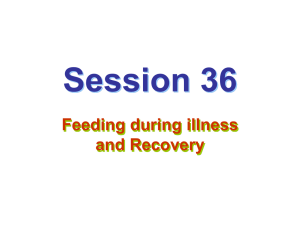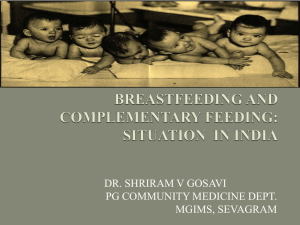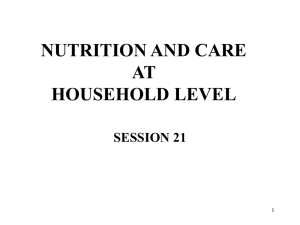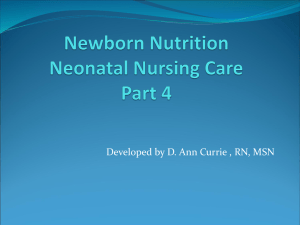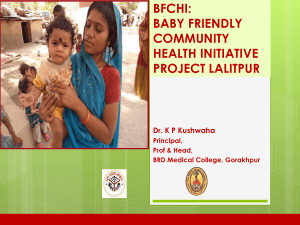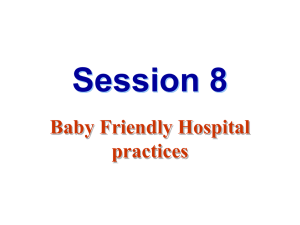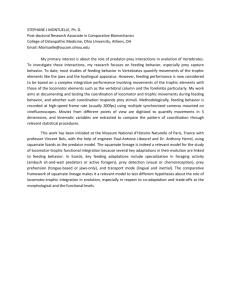Terms of Reference
advertisement
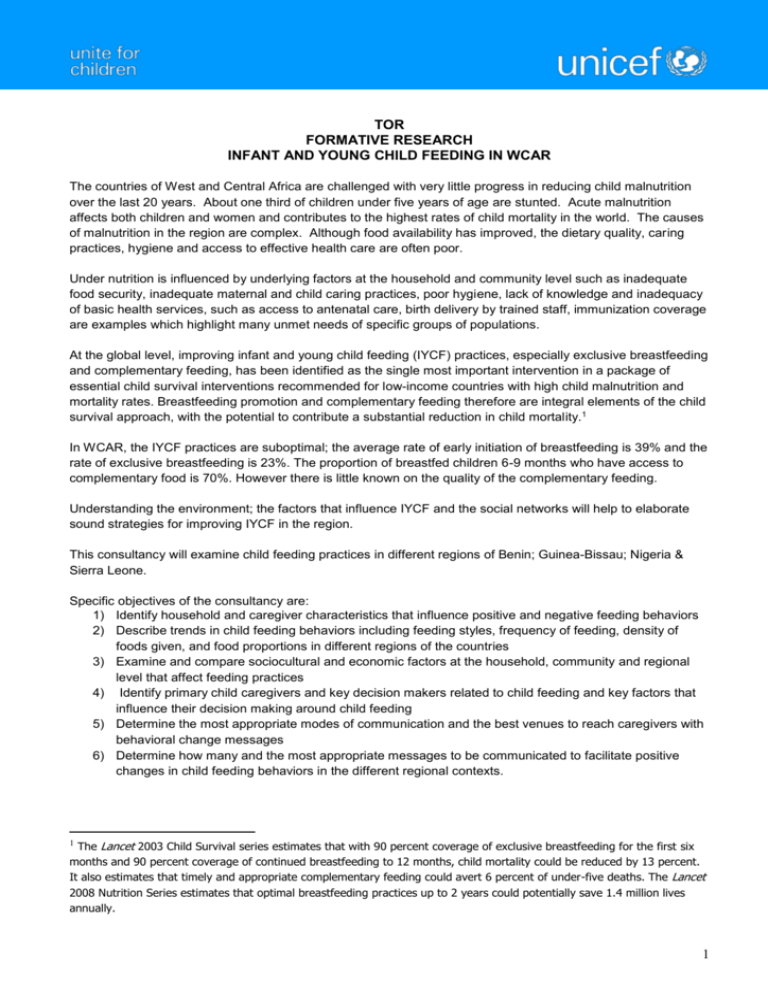
TOR FORMATIVE RESEARCH INFANT AND YOUNG CHILD FEEDING IN WCAR The countries of West and Central Africa are challenged with very little progress in reducing child malnutrition over the last 20 years. About one third of children under five years of age are stunted. Acute malnutrition affects both children and women and contributes to the highest rates of child mortality in the world. The causes of malnutrition in the region are complex. Although food availability has improved, the dietary quality, caring practices, hygiene and access to effective health care are often poor. Under nutrition is influenced by underlying factors at the household and community level such as inadequate food security, inadequate maternal and child caring practices, poor hygiene, lack of knowledge and inadequacy of basic health services, such as access to antenatal care, birth delivery by trained staff, immunization coverage are examples which highlight many unmet needs of specific groups of populations. At the global level, improving infant and young child feeding (IYCF) practices, especially exclusive breastfeeding and complementary feeding, has been identified as the single most important intervention in a package of essential child survival interventions recommended for low-income countries with high child malnutrition and mortality rates. Breastfeeding promotion and complementary feeding therefore are integral elements of the child survival approach, with the potential to contribute a substantial reduction in child mortality.1 In WCAR, the IYCF practices are suboptimal; the average rate of early initiation of breastfeeding is 39% and the rate of exclusive breastfeeding is 23%. The proportion of breastfed children 6-9 months who have access to complementary food is 70%. However there is little known on the quality of the complementary feeding. Understanding the environment; the factors that influence IYCF and the social networks will help to elaborate sound strategies for improving IYCF in the region. This consultancy will examine child feeding practices in different regions of Benin; Guinea-Bissau; Nigeria & Sierra Leone. Specific objectives of the consultancy are: 1) Identify household and caregiver characteristics that influence positive and negative feeding behaviors 2) Describe trends in child feeding behaviors including feeding styles, frequency of feeding, density of foods given, and food proportions in different regions of the countries 3) Examine and compare sociocultural and economic factors at the household, community and regional level that affect feeding practices 4) Identify primary child caregivers and key decision makers related to child feeding and key factors that influence their decision making around child feeding 5) Determine the most appropriate modes of communication and the best venues to reach caregivers with behavioral change messages 6) Determine how many and the most appropriate messages to be communicated to facilitate positive changes in child feeding behaviors in the different regional contexts. The Lancet 2003 Child Survival series estimates that with 90 percent coverage of exclusive breastfeeding for the first six months and 90 percent coverage of continued breastfeeding to 12 months, child mortality could be reduced by 13 percent. It also estimates that timely and appropriate complementary feeding could avert 6 percent of under-five deaths. The Lancet 2008 Nutrition Series estimates that optimal breastfeeding practices up to 2 years could potentially save 1.4 million lives annually. 1 1 MAIN DUTIES/RESPONSIBILITIES: 1) Develop formative research protocol a. Review relevant literature and materials presently used to convey child feeding messages b. Develop preliminary protocol c. Dialogue with interns from IRD (Benin) d. Travel to countries (Benin, Sierra Leone, and Guinea-Bissau) to meet with collaborators and identify resources for study implementation e. Finalize preliminary protocol f. Submit to ethical review committee and finalize 2) Implement and oversee study a. Orient intern (Benin) b. Train data collectors (Benin, Sierra Leone, and Guinea-Bissau) c. Test and modify study instruments d. Initiate data collection e. Supervise data collection f. Review transcripts and modify guidelines if needed 3) Analyze data a. Develop code lists b. Code data sets c. Carry out a full data analysis d. Supervise data analysis of interns 4) Report writing and data dissemination a. Write-up data findings b. Develop recommendations for key child feeding messages c. Share findings with key partners Output Formative research protocol Country support reports Database for each country QUALIFICATIONS REQUIRED FOR THE ASSIGNMENT: a) EDUCATION PhD in social sciences or anthropology. b) WORK EXPERIENCE A minimum of 10 years of progressively responsible work experience in research on nutrition and public health. An experience in the field of Communication for Development in a UN organization is an asset. c) LANGUAGES Fluency in English, working knowledge of French will be an asset. COMPETENCIES Knowledge of current developments in the fields of formative research, behavioural sciences and public nutrition. Proven ability to lead research teams Proven ability to conceptualise and plan. Ability to express clearly and concisely ideas and concepts in written and oral form. Work experience in sub-Saharan Africa 2 Computer skills, including internet navigation and various office applications. WORK SCHEDULE: The Nutrition Info dashboard will be developed in two modules: user and database administration described below, through a phased approach. The majority of the work is expected to be completed in less than six months, follow-up activities will continue after the system is launched. For this reason, the contract duration is on year. Part Time: X Duty Station: Dakar Guinea-Bissau & Sierra Leone Estimated Total Working Days: 150 Work place of consultant: Senegal, Benin, 3
